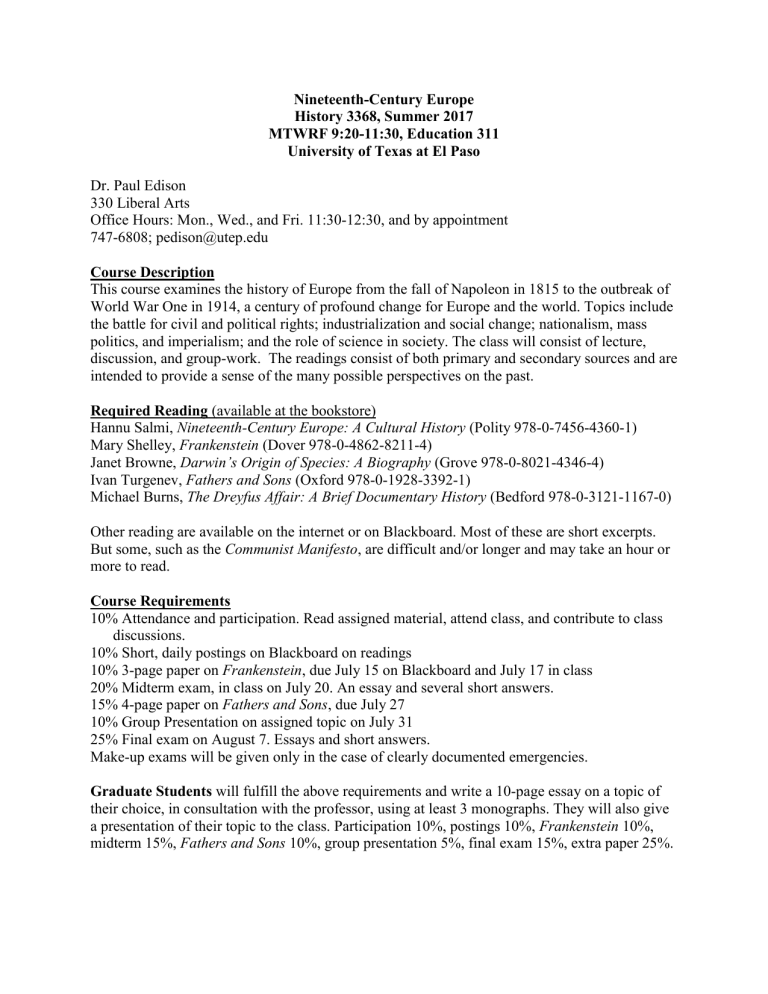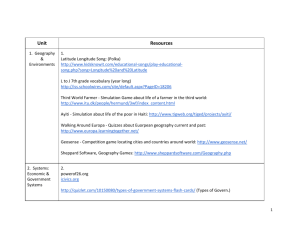
Nineteenth-Century Europe History 3368, Summer 2017 MTWRF 9:20-11:30, Education 311 University of Texas at El Paso Dr. Paul Edison 330 Liberal Arts Office Hours: Mon., Wed., and Fri. 11:30-12:30, and by appointment 747-6808; pedison@utep.edu Course Description This course examines the history of Europe from the fall of Napoleon in 1815 to the outbreak of World War One in 1914, a century of profound change for Europe and the world. Topics include the battle for civil and political rights; industrialization and social change; nationalism, mass politics, and imperialism; and the role of science in society. The class will consist of lecture, discussion, and group-work. The readings consist of both primary and secondary sources and are intended to provide a sense of the many possible perspectives on the past. Required Reading (available at the bookstore) Hannu Salmi, Nineteenth-Century Europe: A Cultural History (Polity 978-0-7456-4360-1) Mary Shelley, Frankenstein (Dover 978-0-4862-8211-4) Janet Browne, Darwin’s Origin of Species: A Biography (Grove 978-0-8021-4346-4) Ivan Turgenev, Fathers and Sons (Oxford 978-0-1928-3392-1) Michael Burns, The Dreyfus Affair: A Brief Documentary History (Bedford 978-0-3121-1167-0) Other reading are available on the internet or on Blackboard. Most of these are short excerpts. But some, such as the Communist Manifesto, are difficult and/or longer and may take an hour or more to read. Course Requirements 10% Attendance and participation. Read assigned material, attend class, and contribute to class discussions. 10% Short, daily postings on Blackboard on readings 10% 3-page paper on Frankenstein, due July 15 on Blackboard and July 17 in class 20% Midterm exam, in class on July 20. An essay and several short answers. 15% 4-page paper on Fathers and Sons, due July 27 10% Group Presentation on assigned topic on July 31 25% Final exam on August 7. Essays and short answers. Make-up exams will be given only in the case of clearly documented emergencies. Graduate Students will fulfill the above requirements and write a 10-page essay on a topic of their choice, in consultation with the professor, using at least 3 monographs. They will also give a presentation of their topic to the class. Participation 10%, postings 10%, Frankenstein 10%, midterm 15%, Fathers and Sons 10%, group presentation 5%, final exam 15%, extra paper 25%. Class Schedule and Reading Assignments 7/11 Europe, 1789-1815; Congress of Vienna Declaration of Rights of Man and Citizen (1789) http://avalon.law.yale.edu/18th_century/rightsof.asp Alexander I, “Holy Alliance” (1815) In class: Eroica (2003), https://www.youtube.com/watch?v=UtA7m3viB70 7/12 Machines and Utilitarianism Salmi, Nineteenth-Century Europe, intro. and chap. 1 Leeds Woollen Workers Petition (1786) https://sourcebooks.fordham.edu/Halsall/mod/1786machines.asp Letter from Leeds Cloth Merchants (1791) https://sourcebooks.fordham.edu/Halsall/mod/1791machines.asp Richard Guest, from Compendious History of the Cotton Manufacture (1823) https://sourcebooks.fordham.edu/Halsall/mod/1823cotton.asp William Radcliffe, from Origin of the New System of Manufacture (1828) https://sourcebooks.fordham.edu/Halsall/mod/1828looms.asp Jeremy Bentham, from Principles of Legislation (1789) 7/13 Mary Shelley, Frankenstein (1818) 7/14 European Politics, 1815-1832 Joseph de Maistre, “The Authority of Custom” (1814) Prince Metternich, “Carlsbad Decrees” (1819) Prince Metternich, “Confession of Faith” (1820) T. B. Macaulay, Speech on parliamentary reform (1831) 7/15 Paper on Frankenstein is due by 5:00 PM on Blackboard. In three double-spaced pages, discuss the novel’s attitude towards social and political change. 7/17 Power, Poverty, and Reform Salmi, Nineteenth-Century Europe, chap. 2 Daniel Headrick, “The Tools of Imperialism: Technology and the Expansion of European Colonial Empires in the Nineteenth Century,” Journal of Modern History 51, 2 (1979): 231-244. [JSTOR] Thomas Gisborne, from Enquiry into the Duties of the Female Sex (1797) Thomas Malthus, from An Essay on the Principle of Population (1798) Robert Owen, “Report to the County of Lanark” (1821) Evidence Given Before the Sadler Committee (1832) http://www.victorianweb.org/history/workers1.html Chadwick, Report on Sanitary Conditions (1842) 7/18 Socialism Saint-Simon, “The Parable of Saint-Simon” (1819) Charles Fourier, “Of Education,” “The Phalanstery,” “Attractive Labor” (1830s-40s) “National Petition” (1839) Etienne Cabet, from Voyage to Icaria (1840) and “Communist Creed” (1841) Flora Tristan, from The Workers’ Union (1843) Karl Marx and Friedrich Engels, from The Communist Manifesto (1848) 7/19 Emotions and Nations Salmi, Nineteenth-Century Europe, chaps. 3 and 4 Johann Gottlieb Fichte, “What Is a People in the Higher Meaning of the Word, and What is Love of Fatherland?” (1808) Ernst Moritz Arndt, “The German Fatherland” (1813) Percy Bysshe Shelley, “A Defence of Poetry” (1821) Stendhal, “The Salon of 1824” (1824) Giuseppe Mazzini, “The Duties of Man” (1844) Jules Michelet, “Our Native Land” (1846) 7/20 Revolutions of 1848 Documents on France (1848) Hungarian Declaration of Independence (1849) Midterm exam 7/21 Middle Classes and the Second Industrial Revolution Salmi, Nineteenth-Century Europe, chap. 5 Two articles from The Economist (1851) John Stuart Mill, from On Liberty (1859) Samuel Smiles, from Self-Help (1859) https://sourcebooks.fordham.edu/Halsall/mod/1882smiles.asp Isabella Beeton, from The Book of Household Management (1861) http://ebooks.adelaide.edu.au/b/beeton/isabella/household/chapter1.html John Stuart Mill, from The Subjection of Women (1869) 7/24 Darwin Janet Browne, Darwin’s Origin of Species Charles Darwin, from The Origin of Species (1859) Ernest Renan, from The Life of Jesus (1863) 7/25 Film: Angels and Insects 7/26 Nations and Nation-Building, 1850s-60s Louis Napoleon, Speech to the Bordeaux Chamber of Commerce (1852) Documents on German unification (1848-71) https://sourcebooks.fordham.edu/Halsall/mod/germanunification.asp - Proclamation of 1849 John Leighton, “One Day under the Paris Commune” (1871) 7/27 Russia Ivan Turgenev, Fathers and Sons Paper on Fathers and Sons is due. In four double-spaced pages, discuss the role of science in the novel. 7/28 Mass Politics Hobsbawm, “Mass-Producing Traditions: Europe, 1870-1914,” in The Invention of Tradition, pp. 263-307 Otto von Bismarck, Speech on the Law for Workmen’s Compensation (1884) Pope Leo XIII, from Rerum Novarum (1891) Emmeline Pankhurst, “Why We Are Militant” (1913) 7/31 Urban life and consumerism Salmi, Nineteenth-Century Europe, chaps. 6-7 Otto von Leixner, from Letters from Berlin (1891) Student presentations 8/1 Empire Salmi, Nineteenth-Century Europe, chap. 8 Daniel Headrick, “The Tools of Imperialism: Technology and the Expansion of European Colonial Empires in the Nineteenth Century,” Journal of Modern History 51, 2 (1979): 244-263. Joseph Chamberlain on empire (1905) 8/2 Anti-Semitism Michael Burns, France and the Dreyfus Affair Heinrich von Treitschke, “In Memory of the Great War” (1895) 8/3 Fin-de-siècle Salmi, Nineteenth-Century Europe, chap. 9 and conclusion Friedrich Nietzsche, from Beyond Good and Evil (1886) Chamberlain (1899) and the Pan-German League (1913) Francis Galton, “Eugenics: Its Definition, Scope, and Aims” (1904) Sigmund Freud, from Introductory Lectures on Psychoanalysis (1915-17) 8/7 Final exam: Monday 1:00-3:45

